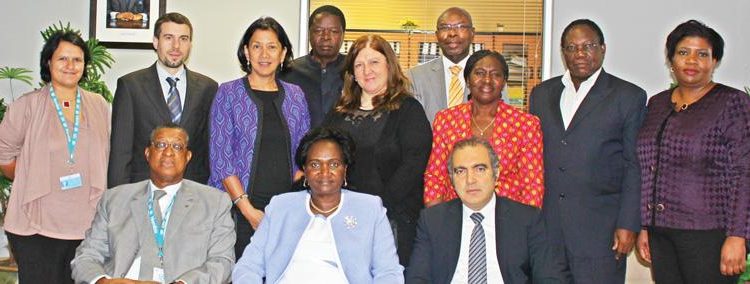Namibia/abril de 2016/All Africa
Resumen: El Ministerio de Educación Superior, Capacitación e Innovación acoge la primera misión exploratoria de las Naciones Unidas para la Educación, la Ciencia y (UNESCO) de la Organización de la Cultura de Namibia, que comenzó el 18 de abril y finalizará el 28. La misión tiene como objetivo evaluar las actuaciones prácticas y las cuestiones de educación, formación e innovación instituciones superiores tales como Tecnología Ciencia Técnica y formación profesional (FTP) y educación Superior y e Innovación (CTI) Sistemas de Namibia.
The Ministry of Higher Education, Training and Innovation is hosting the first United Nations Educational, Scientific and Cultural Organisation’s (UNESCO) scoping mission to Namibia, which started on 18 April and will end on 28. The mission aims at evaluating the practical performances and issues of higher education, training and innovation institutions such Technical and Vocational Training (TVET) and Higher Education and Science Technology and Innovation (STI) Systems in Namibia.
The UNESCO scoping mission to Namibia is an initiative of the Ministry which, together with UNESCO, strongly supports the review of Technical and Vocational Education and Training (TVET), Higher Education and Science, Technology and Innovation System in Namibia. During the mission, UNESCO technical experts and a complementary team from Namibia, will hold discussions with the relevant government Ministries, institutions and stakeholders. The aim of the mission is to assist the newly established Ministry in defining policies and programmes related to the three pillars of the Ministry (Higher education, Training and Innovation) by assessing the current status of TVET, higher education and innovation in Namibia, identify strategic priorities and proposing alternative interventions responding to those priorities. Furthermore, it aims to consider the contribution of Technical and Vocational Training, higher education and innovation to overall development goals such as poverty eradication as highlighted in the Harambee Prosperity Plan.
Speaking at the press conference held this week the Minister of Higher Education, Training and Innovation, Hon. Dr Itah Kandjii-Murangi said, «At the onset, the Ministry aims to take stock to establish – what do we have, where is it, does it yield intend results, how do we improve having efficiency and effectiveness in mind? Thus, the assessment of the situation by the UNESCO and ILO (International Labour Organisation) is paramount». The minister explained that UNESCO’s mandate also covers aspects of natural sciences including science, technology and innovation policies as well as sectoral programmatic areas such as ICT, climate change and many others. «As the technical agency of the UN, the organisation prides itself with excellent technical capacity argumented by appropriate exposure and experience,» said the minister.
Meanwhile, UNESCO’s Director General Dr Irina Bokova alongside a team of 8 international experts have drafted a proposal for the review of Technical and Vocational Education and Training. The end of the review will yield a diagnosis of the current strengths and weaknesses of Namibia system. Dr Itah Kandjii-Murangi in her closing remarks noted that the findings of the assessments will be validated by all stakeholders and the recommendations will be benchmarked with international best policies, before being adopted for implementations.
Fuente de la noticia: Namibia: Unesco Reviews Vocational and Technical Training Education
Fuente de la imagen: https://economist.com.na/wp-content/uploads/2016/04/UNESCO-scoping-mission.jpg








 Users Today : 6
Users Today : 6 Total Users : 35460215
Total Users : 35460215 Views Today : 8
Views Today : 8 Total views : 3418903
Total views : 3418903